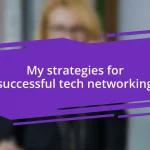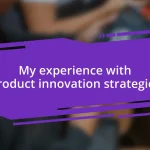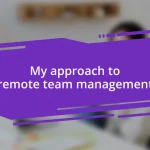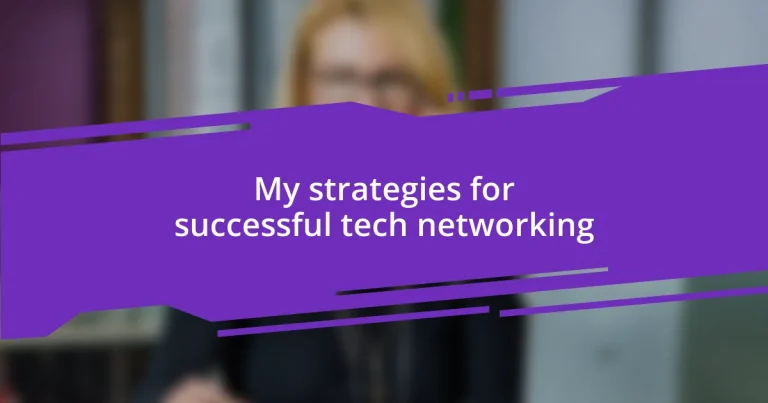Key takeaways:
- Networking is about building meaningful relationships that can lead to unexpected opportunities, mentorships, and fresh perspectives in the tech industry.
- Setting clear networking goals and regularly reassessing them helps to focus efforts and adapt to professional growth, encouraging engagement with new connections.
- Effective communication techniques, such as active listening and adapting your message to the audience, are essential for fostering deeper professional relationships and ensuring collaboration.
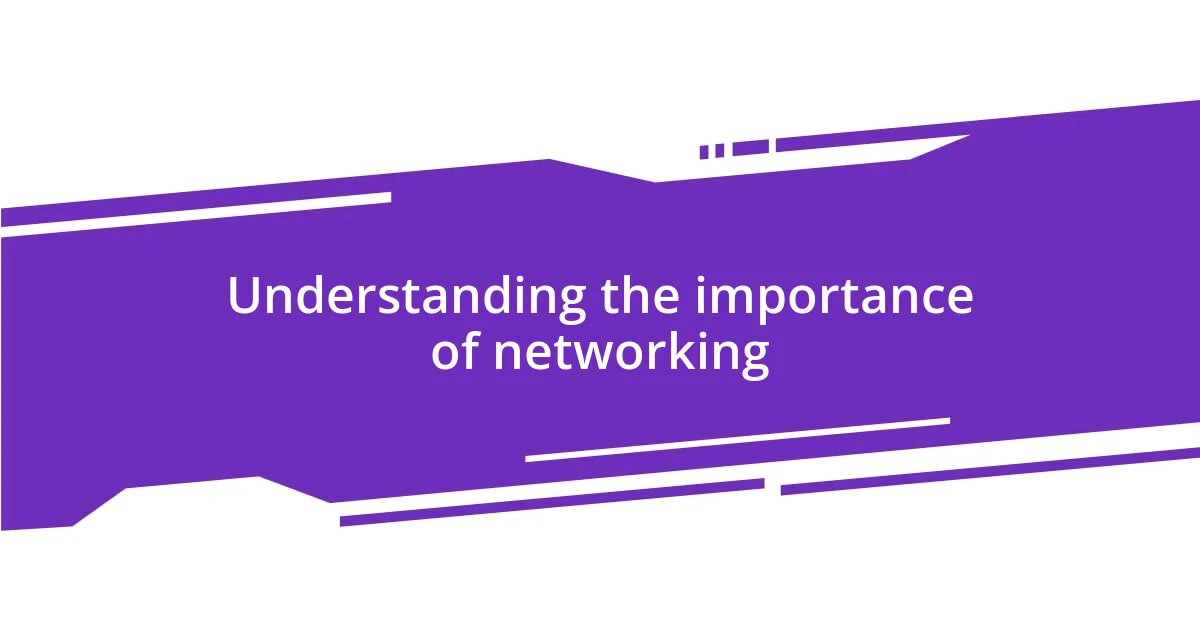
Understanding the importance of networking
Networking in the tech world isn’t just about exchanging business cards; it’s about building meaningful relationships that can foster collaboration and growth. I remember when I attended my first tech conference. I felt out of place but decided to push through my discomfort, and it turned out to be the best decision. One conversation led to a mentorship that completely shifted my career trajectory. Have you ever had a similar experience where a chance meeting opened unexpected doors?
Understanding the importance of networking also extends to gaining fresh perspectives. Every connection offers a unique view shaped by individual experiences. I once met a software developer who introduced me to a coding methodology I’d never encountered. This not only improved my skills but also transformed how I approached problem-solving. Isn’t it fascinating how one conversation can spark new ideas?
Moreover, networking can be a powerful way to tap into opportunities that aren’t always advertised. Many jobs are filled through referrals or word of mouth, something I’ve experienced firsthand. By nurturing these connections, I’ve often been considered for roles based solely on recommendations from my network. It’s a bit like having a soft launch into job opportunities—how many of us miss out because we haven’t taken the time to engage with others?
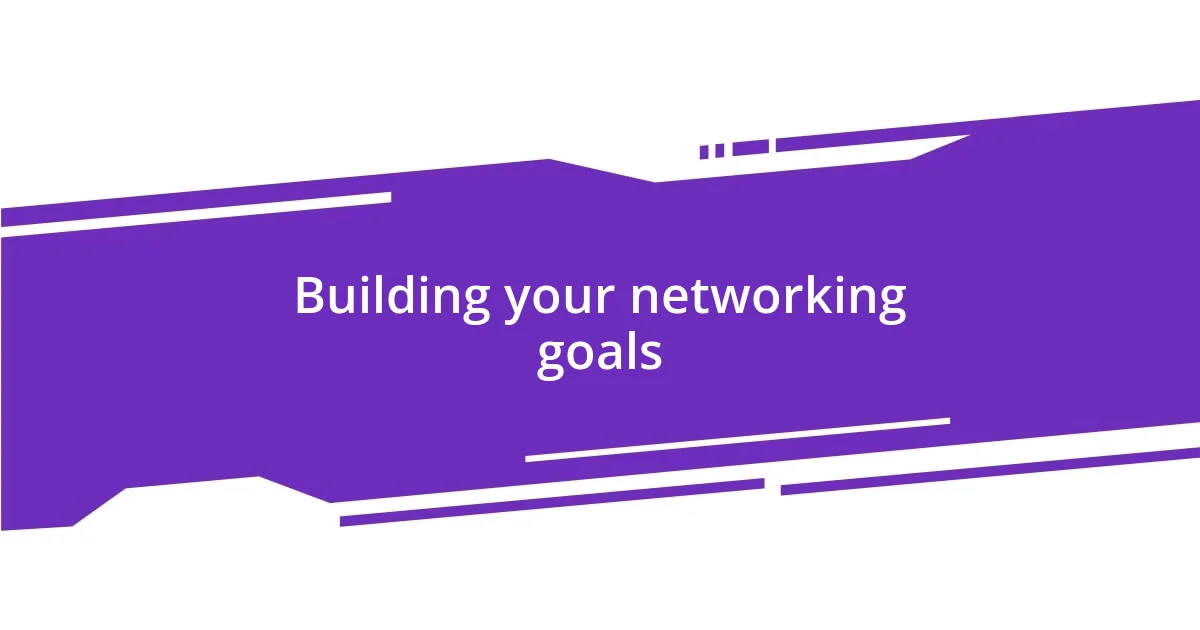
Building your networking goals
Setting clear networking goals is essential for making your efforts fruitful. I always start by asking myself what I want to achieve. For instance, are you looking to connect with potential mentors, gain insights into industry trends, or find job opportunities? When I set a goal to connect with five industry leaders, I felt more focused during events, and it turned my anxiety into excitement. Have you thought about what you really want from your networking experiences?
Next, it’s vital to prioritize your connections based on your goals. After one event, I realized that spending too much time with familiar faces, while comfortable, wasn’t helping me grow. So, I began to challenge myself to engage with at least one new person each time. This approach not only expanded my network but often led to unexpected collaborations. What’s been your biggest takeaway from shifting your focus in networking?
Lastly, regularly reassessing your goals ensures you stay aligned with your professional journey. I’ve learned that what I aim for can change as I grow. By revisiting my networking objectives every few months, I can adapt and stay relevant in a fast-evolving tech landscape. Maintaining flexibility in your goals might lead to exciting new directions you hadn’t considered. Isn’t it empowering to realize you can shape your networking experience intentionally?
| Networking Goals | Actions to Achieve Goals |
|---|---|
| Identify Key Objectives | Create a list of what you want to achieve (e.g., mentorship, job opportunities) |
| Prioritize Connections | Engage with new individuals while also nurturing existing relationships |
| Regularly Reassess Goals | Review and adapt your goals every few months to align with professional growth |
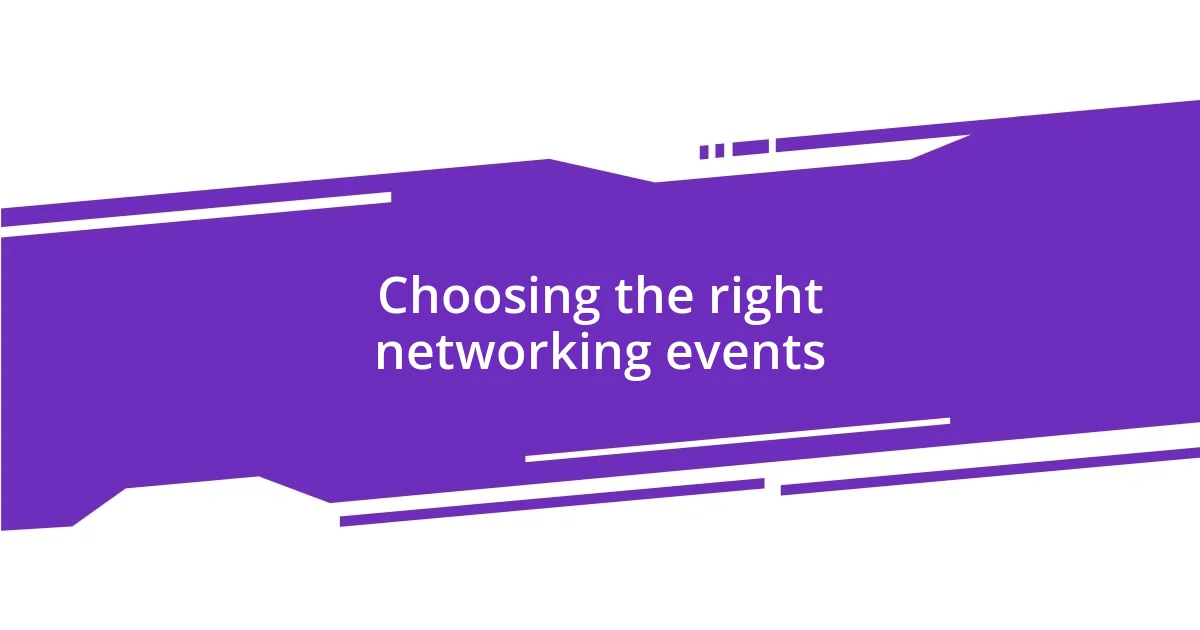
Choosing the right networking events
Choosing the right networking events is crucial for maximizing the impact of your efforts. One time, I made the mistake of attending a large, flashy tech expo that showcased everything from software to hardware without any clear focus. I left feeling overwhelmed and disconnected. It taught me that it’s better to seek out smaller, niche events where attendees share similar interests and goals, making meaningful interactions much easier. Have you ever felt lost in a sea of attendees rather than truly connecting with anyone?
When selecting events, consider a few key factors to enhance your experience:
-
Relevance: Choose events that align with your career goals and industry focus. For example, if you’re in software development, look for coding bootcamps or tech meetups.
-
Size and Atmosphere: Smaller events often foster deeper connections. I’ve found intimate gatherings to be perfect for chatting with industry leaders, while larger events can sometimes feel impersonal.
-
Format: Pay attention to the structure of the event. Workshops and breakout sessions usually encourage engagement and collaboration, helping you leave with more connections than a typical lecture format would.
By being intentional in your choices, you’re more likely to walk away with valuable relationships rather than just a handful of business cards. Think about how these aspects have influenced your networking journey thus far!
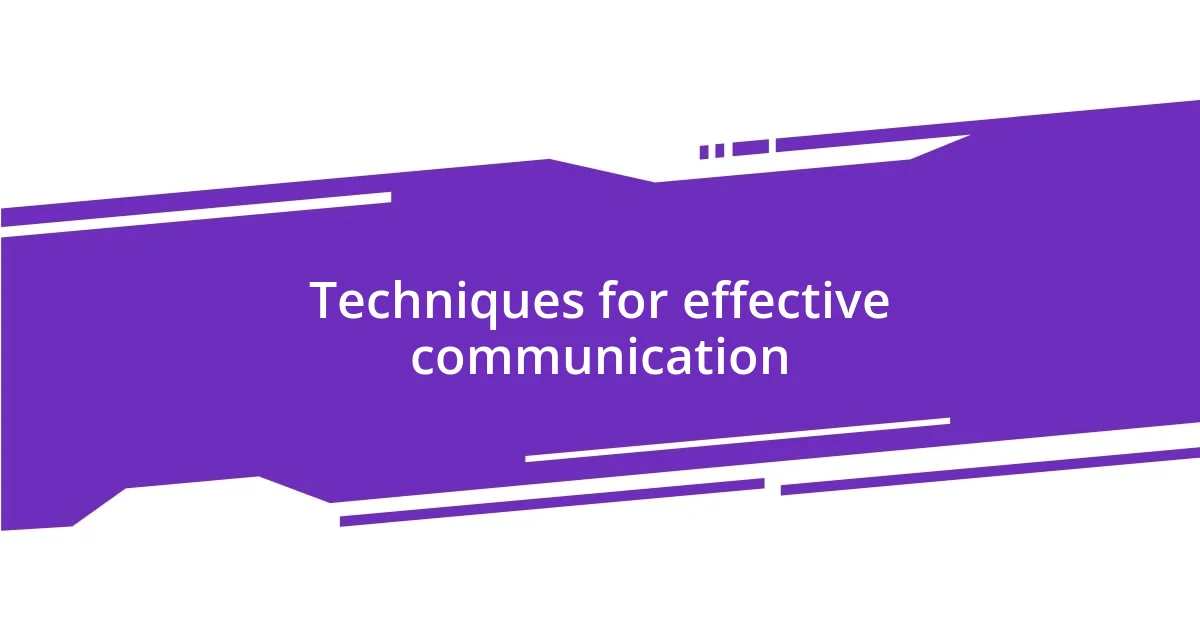
Techniques for effective communication
Effective communication is the bedrock of successful networking. One technique I’ve found invaluable is the art of active listening. When I’m genuinely engaged in a conversation, I can feel the connection deepen. It’s not just about waiting for my turn to speak; instead, I focus on understanding the other person’s perspective. Have you noticed how much more meaningful relationships become when you truly listen?
Another powerful technique is to tailor your message to your audience. I remember attending a tech seminar where the room was filled with varying expertise—from seasoned developers to those just starting. I realized that adapting my conversation style based on who I was speaking with made a significant difference. It’s about finding common ground and ensuring that everyone feels included and valued. How do you adjust your communication style in different settings?
Lastly, non-verbal cues can speak louder than words. I often pay attention to body language, both my own and that of others. A friendly smile or maintaining eye contact can establish warmth and trust right from the start. There was a moment during a networking event where I noticed someone’s closed-off posture. When I adjusted my approach by relaxing my demeanor, the conversation blossomed. Have you experienced a shift in communication simply by being aware of body language?
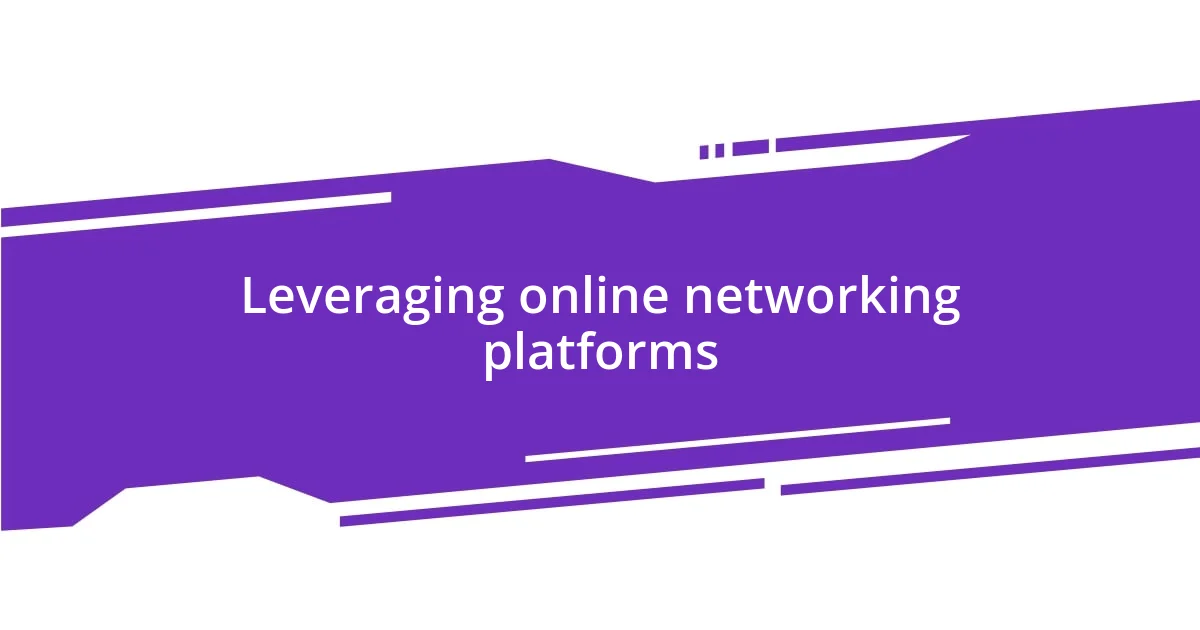
Leveraging online networking platforms
Utilizing online networking platforms can be a game-changer in expanding your professional circle. I particularly enjoy LinkedIn, where I’ve found that a well-crafted profile can attract opportunities and connections that I may not have encountered otherwise. Have you ever considered how much a polished online presence can elevate your professional branding?
Beyond updating my profile, I actively participate in groups related to my field. During one lively discussion about emerging AI technologies, I contributed an insight that led to several direct messages from other professionals wanting to discuss ideas further. Engaging in these conversations has added layers to my professional relationships, making them not just connections, but collaborations. How often do you dive into these discussions on platforms dedicated to your industry?
Moreover, I’m a huge advocate for using platforms like Twitter for networking. I remember joining a live tweet chat about tech innovations and spontaneously exchanging ideas with some industry leaders. The instant feedback and dialogue felt refreshing, and I was surprised at how quickly I formed connections with people from different parts of the world. Have you tried participating in similar events online, and if so, what connections have you made?
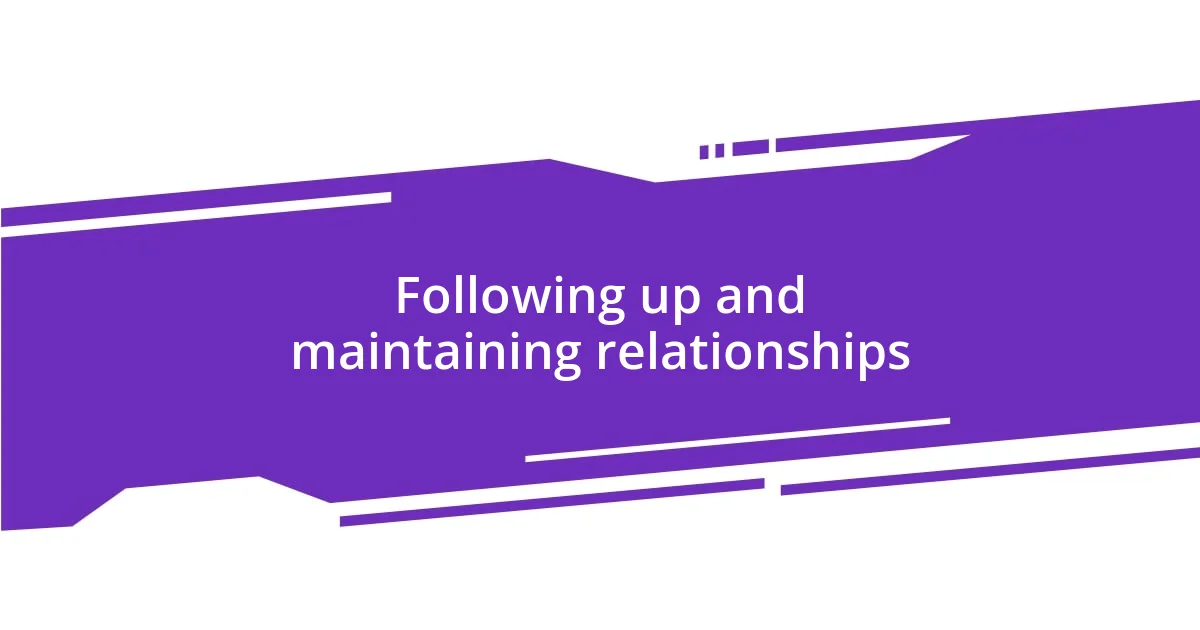
Following up and maintaining relationships
Staying in touch after an initial meeting is essential for nurturing professional relationships. I often follow up with a brief email or a message through a platform like LinkedIn, expressing my appreciation for the conversation we had. It’s a simple gesture, yet it can mean the world to someone, don’t you think? I’ve noticed that those small touches often lead to deeper connections later on.
One technique I’ve adopted is setting reminders to reconnect periodically. For instance, if a colleague mentioned a project they were excited about, I’ll check in a few weeks later to ask how it’s progressing. This not only shows genuine interest but reinforces that I value them beyond just a networking opportunity. Have you ever reached out to someone after a while, only to find that they’re thrilled to hear from you?
Ultimately, relationships are like plants; they need regular attention to flourish. I try to engage with my contacts by sharing articles, inviting them to events, or just dropping a message every now and then. Each interaction builds a bridge that can lead to more significant collaborations down the road. Isn’t it amazing how maintaining these connections can open doors you never anticipated?
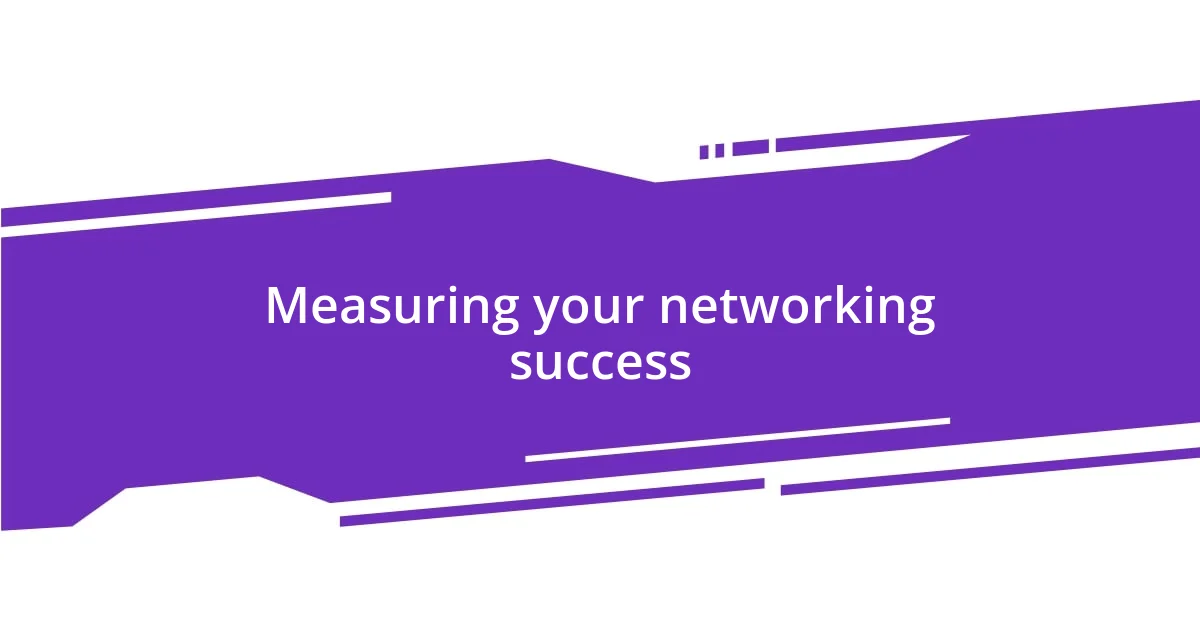
Measuring your networking success
Measuring the success of your networking efforts isn’t just about the number of connections you make; it’s about the quality of those relationships. For me, success often comes down to the depth of conversations I’ve had after an initial meeting. I remember when I connected with a mentor at a tech conference; our chat turned into a coffee catch-up that opened the door to ongoing advice and support. Have you ever had a similar experience where a single conversation shifted your perspective?
Another way I gauge my networking success is by tracking the opportunities that arise from my connections. I once reached out to a fellow alumni and, within weeks, I was invited to collaborate on a project—a direct result of that initial outreach. I find it incredibly rewarding to look back and see tangible outcomes from relationships I nurtured. How do you keep score of the benefits your networking brings your way?
Finally, I pay attention to the engagement level of my contacts. If someone is actively reaching out to me, sharing ideas, or collaborating, I know that our relationship is thriving. I remember when a colleague frequently shared resources and insights that related to my work; that motivated me to reciprocate and contribute to our mutual growth. Doesn’t it feel great to know your network is alive and dynamic, rather than just a static list of names?
